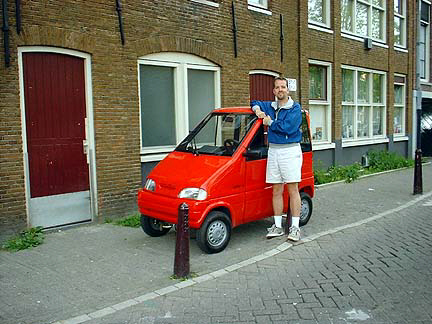Leaving America: A Stranger in One's Own Land
What are the phsycological effects of living in Southern California for years on end? In this latest edition of Stern Magazine's Living in America series, the author examines the pains and pleasures of going home to Germany, after years in America's desert mecca.
by Milan Obradovic on 'Living in America' Blog 
Translated By Susanne Angelow
September 18, 2006
Germany - Stern - Original
Article (German) 
For the first
time in two years, I will soon return to Germany for a visit.
Of course
I look forward to seeing my friends and family, but I'm also curious to see how
my perceptions of my homeland have changed. All the ways that I have had to
adapt, and that I have written about on this Blog and have become part of my
daily life will be set aside for a couple of weeks. Is it possible to become a
stranger in one's own country? Once a number of years ago, I had such an
experience.
At the
time, upon returning to Germany after a long stint in the U.S., my strongest
impression during my flight's approach to Hamburg was how green everything was,
especially compared to the bleached-brown desert vegetation of Southern
California. There, the most likely place you'll find such bold green color are in
the gardens of Beverly Hills.
 After a few years in southern California, European
After a few years in southern California, European
cars like this could take some getting used to!
---------------------------------------------------------------------------
In
Germany we flew over bright meadows and fields -I was even able to spot some
black-and-white colored cows as we descended - and then for about five seconds I
saw some homes before we came to a standstill on the runway. And this was in
the midst of Germany's second largest city. Before landing in Los Angeles one
must fly for at least 15 minutes over the houses and streets of the Inland
Empire, the suburbs of Los Angeles, that reach endlessly to the East side of
the city.
And here's
the second shock one receives upon returning to Germany: all at once, everything
appears so small. Cars, streets, parking lots, houses, advertising
billboards, grocery stores, absolutely everything. Just last week I was reminded
of the vastly different understanding of dimensions, when a group of Americans
found it amusing that a large person could fit into a small car. Why were they so
amused? An extremely tall guy (6 foot 1 inch) had driven by in a ridiculously
small car (a VW golf). I guess nobody would have
believed me had I tried to explain that in Europe, there are even smaller cars
than the VW Golf.
Even in a
metropolis like Hamburg, the narrow streets have an enormous advantage: they
are incredibly level and well-kept, especially compared to the
concrete-patchwork and crater-filled landscapes that are the streets of LA. And
it will certainly be quite an adventure for me to hit the gas pedal on the
Autobahn [High-Speed Road  ]. My heart bleeds when I realize that our fine German cars which
decorate the roads of America will never experience this.
]. My heart bleeds when I realize that our fine German cars which
decorate the roads of America will never experience this.
I have
also been forewarned that shopping in Germany requires some adjustment. First
of all, all the businesses in Germany are closed when I am accustomed to going
shopping (in the evenings and on Sunday). And when you pay, funny multi-colored
bills are used instead of credit cards. Furthermore, you have to put your
groceries into shopping bags by yourself and - totally hilarious to Americans-
you have to pay extra for the bags.
Eating
out is likewise very different. At a neighboring table, even in 2006 one can be
quite sure that people will be smoking to their heart's content. But at least one
can escape with a tip of 2 euros rather than 20 dollars. And at least a .2
liter coke (6.7 ounce) doesn't taste like chlorine, even though unfortunately,
one must pay for every glass [there are no refills]. And is I want to meet a
friend afterwards, I would most likely write them an SMS text message.
Unfortunately in Germany, the 1000 free monthly minutes on my cell phone don't apply, even though my U.S. contract is with T-mobile ["T"
stands for Telekom, which is the top German telephone service provider].
German TV
and radio are likely to hold a potential culture shock for me. Recently, whenever
I have seen or heard German radio or television on the Internet, I became
literally irritated by the German language. It seemed so rigid and formal,
somehow "fake," if you can forgive my use of an English word here. I couldn't
stop myself from chuckling and even joked with my wife: "listen to the
funny way these guys talk …"
 Going from southern California to the stark German winter
Going from southern California to the stark German winter
may be another difficult adjustment for an expat to make.
 ---------------------------------------------------------------------------
---------------------------------------------------------------------------
I have no
explanation for this other than that in the U.S., I only use German when speaking
to family and friends and using the Internet, and thus the formal - and stiff -
German, is something that takes some getting used to. Several months ago when I
telephoned a German company, it also seemed very amusing to me that although it's
still easier for me to speak German, I use it only in private.
Last but
not least, I come to a rather typically Californian "problem" - the weather. I really
look forward to experiencing a season other than summer, but does it need to be
in temperatures under 68 degrees [20 degrees Celsius]?
I have already been warned to bring along a sweater – and not because the air
conditioner is turned on high. Perhaps a grey rainy day in October will make
the inevitable parting from Germany easier, a goodbye that presumably will arrive
just as I get used to everything that appeared so strange when I arrived.
The next
time I will report live from Germany. If you have any coming-home experiences, please
leave me a message so I know what to pay special attention to.
German Version Below
Alte
Heimat in neuem Licht
Milan Obradovic | 18. September 2006 00:00 Uhr
In Kürze werde ich zum ersten Mal seit zwei Jahren zu Besuch in
Deutschland sein.
Natürlich
freue ich mich in erster Linie auf Freunde und Verwandte, aber ich bin auch
gespannt, wie mein Blick auf die alte Heimat sich verändert haben wird. Alle
Umstellungen, von denen ich auf diesem Blog berichtet habe und die für mich zur Normalität geworden sind, werden für ein paar
Wochen wieder außer Kraft gesetzt. Wird man zum Fremden im
eigenen Land? Ein bisschen Erfahrung damit habe ich
schon vor ein paar Jahren sammeln können.
Als ich
das erste Mal von einem längeren USA-Aufenthalt nach Deutschland zurückkam, war
mein stärkster Eindruck im Landeanflug auf Hamburg, wie grün doch alles ist,
vor allem im Kontrast zu der ausgeblichenen, erdigen Wüstenvegetation
Südkaliforniens. So richtig saftiges Grün gibt es hier in
erster Linie in den Gärten von Beverly Hills.
In
Deutschland flogen wir über leuchtende Wiesen und Weiden - ich konnte im
Sinkflug sogar ein paar schwarz-weiße Kühe ausmachen - und plötzlich kamen für
ungefähr fünf Sekunden Häuser und schon bremsten wir auf der Landebahn. Und das mitten in der zweitgrößten Stadt Deutschlands. Im
Landeanflug auf Los Angeles fliegt man erst mal eine Viertelstunde über die
Häuser und Straßen des Inland Empire,
der Vororte von Los Angeles, die sich ewig weit nach Osten erstrecken.
In diesem
Unterschied deutet sich auch der zweite Schock bei der Rückkehr an: alles ist auf einmal so klein. Autos, Straßen,
Parkplätze, Häuser, Werbetafeln, Supermärkte, alles. Erst letzte Woche
wurde ich mal wieder auf das unterschiedliche Größenverständnis aufmerksam, als sich eine Gruppe von Amerikanern köstlich darüber
amüsierte, wie denn ein so großer Mensch ein sooo kleines Auto fahren könnte.
Was war passiert? Ein Mann von gigantischer Größe (1,85 m) war in einem geradezu winzigen Auto vorgefahren (VW Golf). Man hätte mir
wahrscheinlich nicht geglaubt, dass es in Europa noch kleinere Autos gibt.
Die
selbst in einer Großstadt wie Hamburg so schmalen Straßen haben jedoch einen
riesigen Vorteil, sie sind unglaublich eben und intakt, vor allem verglichen
mit dem Asphalt-Patchwork und den Kraterlandschaften auf den Straßen von L.A.
Endlich mal wieder Vollgas auf der Autobahn geben zu können wird bestimmt auch
ein Erlebnis. Es blutet mir das Herz, dass unsere schmucken deutschen Autos in
Amerika das nie erleben werden.
Man hat mich auch schon vorgewarnt, dass das Einkaufen in
Deutschland wieder eine Umstellung erfordert. Zunächst einmal haben die
Geschäfte in Deutschland natürlich zu meinen Haupteinkaufszeiten geschlossen
(abends oder sonntags). Und wenn man
bezahlt, dann mit lustig buntem Bargeld anstatt Kreditkarte. Dazu muss
man Lebensmittel selber einpacken und - ein Brüller für Amerikaner - für die
Tüten bezahlen.
Auswärts
zu essen ist ebenfalls ein anderes Erlebnis. Am Nachbartisch wird selbst im Jahre 2006 sicherlich noch kräftig
gequalmt werden. Wenigstens kommt man beim Trinkgeld
mit 2 Euro statt 20 Dollar weg. Und die 0,2 Liter Cola schmecken zumindest nicht nach Chlor, wenn man auch leider jedes
Glas extra bezahlen muss. Wenn ich mich danach noch
verabreden will, muss ich wahrscheinlich wieder aufs SMS-texten umsteigen. In
Deutschland sind meine 1000 Handy-Freiminuten pro
Monat leider nicht gültig, ob ich in den USA nun bei T-Mobile bin oder nicht.
Deutsches
Fernsehen und Radio sind auch ein potentieller
Kulturschock. Wenn ich in letzter Zeit im Internet deutsche Radio oder Fernsehausschnitte gehört bzw. gesehen habe, hat mich das Deutsch regelrecht irritiert. Es schien steif und formell,
irgendwie "fake", wenn Sie mir ein englisches Wort an dieser Stelle
einmal verzeihen mögen. Meist konnte ich mir ein Schmunzeln nicht verkneifen,
habe sogar mit meiner Frau darüber gelacht, frei nach
dem Motto: "Hör mal, wie komisch die reden..."
Ich kann
mir das nicht anders erklären, als dass sich mein
Deutsch in den USA auf Familie, Freunde und das Internet beschränkt und somit
der offizielle, steifere Sprachumgang wieder gewöhnungsbedürftig ist. Als ich vor ein paar Monaten mit einem deutschen Unternehmen
geschäftlich telefonierte, kam mir das auch sehr komisch vor, und zwar obwohl
ich insgesamt noch immer mehr Deutsch als Englisch spreche, nur eben
ausschließlich privat.
Zuletzt zu einem eher typisch kalifornischen "Problem" - dem
Wetter. Ich
freue mich ja durchaus darauf, mal wieder eine andere
Jahreszeit als Sommer zu erleben, aber muss das gleichzeitig mit Temperaturen
unter 20 Grad Celsius verbunden sein? Man hat mir schon gesagt, ich müsste
einen Pullover mitbringen - und zwar ausnahmsweise nicht, weil die Klimaanlagen zu hoch eingestellt sind. Vielleicht erleichtert ein
regnerisch-grauer Oktobertag den unausweichlichen Abschied aus Deutschland, der
wahrscheinlich genau zu dem Zeitpunkt kommen wird, an dem ich mich an all das wieder gewöhnt habe, was mich im ersten Moment
befremden wird.
Das
nächste Mal werde ich live aus Deutschland berichten. Wenn
Sie auch Rückkehrerfahrungen haben, dann hinterlassen Sie doch bitte einen
Kommentar, dann weiß ich, worauf ich noch besonders achten sollte.